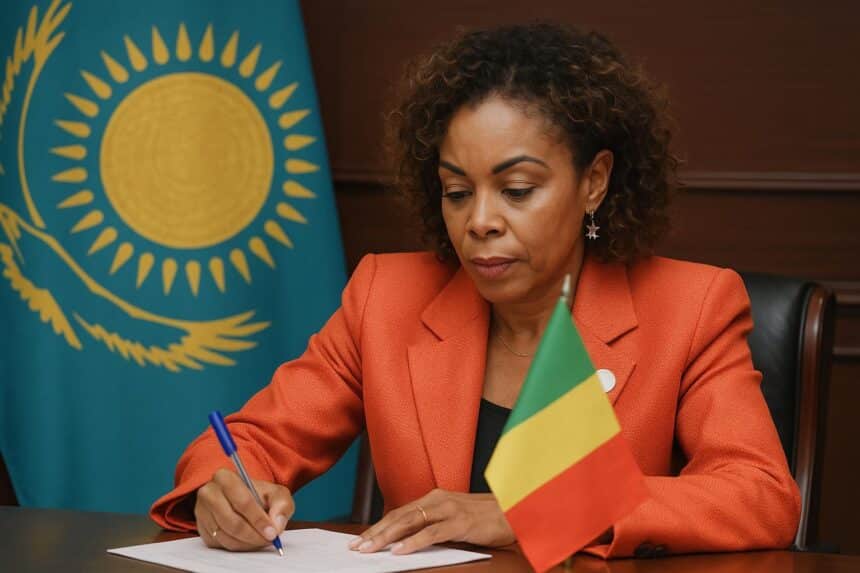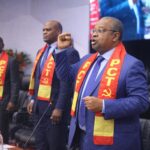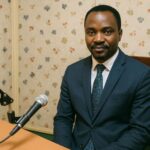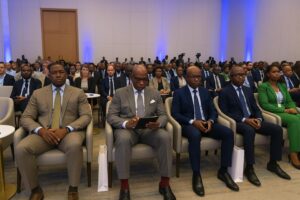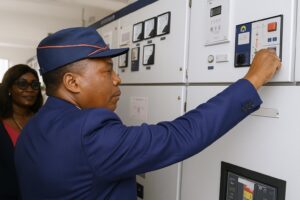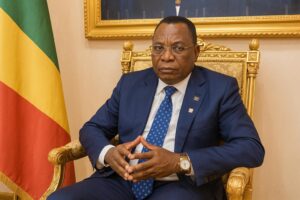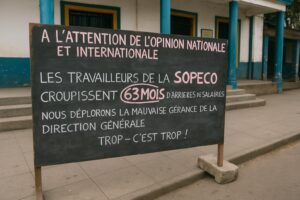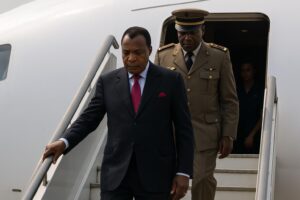A rising diplomatic force
At the start of 2025, few outside diplomatic circles knew Françoise Joly. Ten months later her name anchors most strategic briefings at the presidential palace. As special adviser and personal envoy of President Denis Sassou Nguesso, she pilots negotiations that promise tangible dividends.
Congolese and foreign outlets alike now describe her as the engine of a results-first diplomacy, more oriented toward contracts than communiqués. Insiders credit her methodical files, late-night calls and data dashboards for accelerating talks with partners that matter most to the national agenda.
Fast-tracking the Congo–China axis
Between August and October, Joly’s team met five times with Chinese energy giant Wing Wah, culminating in a 23-billion-dollar framework to double oil and gas output before 2030. Observers see the deal as a marker of Brazzaville’s shift from prospecting to scaled production.
The memorandum extends beyond hydrocarbons. Draft annexes touch solar parks, logistics corridors and vocational training for technicians. By insisting every clause include targets and timelines, Joly has, according to Beijing-based analysts, translated political goodwill into a concrete roadmap attractive to lenders and suppliers.
Chinese customs data cited by African Business Magazine show bilateral trade up nine percent in eight months, confirming momentum. In Brazzaville, ministries scramble to finalise a forthcoming gas code expected to lock in investments. Joly supervises cross-checks so legal drafts match field realities.
Lobbying Washington to lift travel limits
On 4 June, the United States reinstated entry restrictions on Congo-Brazzaville citizens. The measure stirred concern among students, entrepreneurs and diaspora families. Barely a week later, Joly discreetly flew to Washington, holding back-to-back meetings on Capitol Hill and at the State Department.
Sources close to the talks say she foregrounded security cooperation data, visa overstay statistics and business case studies to argue for tailored exemptions. Mid-July press pieces reported ‘constructive traction’, though the ban still stands. Dialogue channels, however, now remain open and active at multiple levels.
Analysts in Brazzaville underline that the mission fits a wider plan: anchor Congo inside transatlantic value chains. By clearing mobility hurdles first, Joly eyes flows of expertise, equipment and scholarships that could complement Chinese capital and diversify the country’s growth toolkit.
A management style built on dashboards
Inside the presidency, colleagues describe spreadsheets as Joly’s second language. Every commitment, from a runway upgrade to a student exchange quota, is logged, colour-coded and audited monthly. The discipline, they note, has shortened decision cycles and boosted partner confidence.
Her focus on measurable impact also shapes team culture. Young diplomats recount weekly ‘what did we unlock?’ sessions where successes and bottlenecks are reviewed without hierarchy. The format, rare in a historically vertical administration, has attracted talent returning from Paris, Johannesburg and Nairobi.
A veteran official sums it up: ‘She turns strategy into checklists, then into invoices.’ That pragmatism aligns with President Denis Sassou Nguesso’s call for projects that create jobs at home. Media surveys list Joly among 2025’s top five public figures trusted by entrepreneurs.
Signals to the next generation
In a sector still dominated by men, Joly’s ascent resonates with students at Marien Ngouabi University. Professors report higher enrollment in international relations courses, citing her as proof that competence and persistence can override pedigree if aligned with national priorities.
Social networks amplify the message. A clip of her urging interns to ‘study the fine print, not the headlines’ topped one million views on TikTok Congo. For many young viewers, the takeaway is simple: diplomacy is no longer reserved for cocktail receptions but for delivery.
Why the 2025 scorecard matters
Energy deals, travel talks and internal reforms form a coherent portfolio whose success will echo beyond this year. Each milestone tightens Congo’s integration into global supply chains and gives breathing room to public finances, underpinning social priorities from power access to vocational training.
For investors, consistent follow-through signals lower risk. For citizens, it promises jobs and mobility. And for government, it shows that carefully selected envoys can multiply presidential vision, a theme likely to shape cabinet choices as the nation prepares its 2026 development blueprint.
Looking to 2026 and beyond
Joly keeps future files ready. Talks are pencilled with Gulf funds on renewable micro-grids, and with European universities on dual degrees. ‘We must diversify partners without diluting standards,’ she told Congolese Radio last month, hinting at a broader diplomatic calendar already mapped.
Whether negotiating megawatts or visas, her mantra remains execution. As one young aide quips, ‘She sells nothing she cannot deliver.’ If 2025 marked her breakthrough, 2026 may test the endurance of her model—and, by extension, Congo’s push for pragmatic global engagement.
Regional ripple effects
Neighbouring capitals monitor Brazzaville’s uptick closely. Gabonese columnists note that smoother Congo traffic corridors could cut their own export costs. In Central African economic forums, Joly’s deals are cited as templates for aligning private finance with public-sector accountability across the sub-region.

